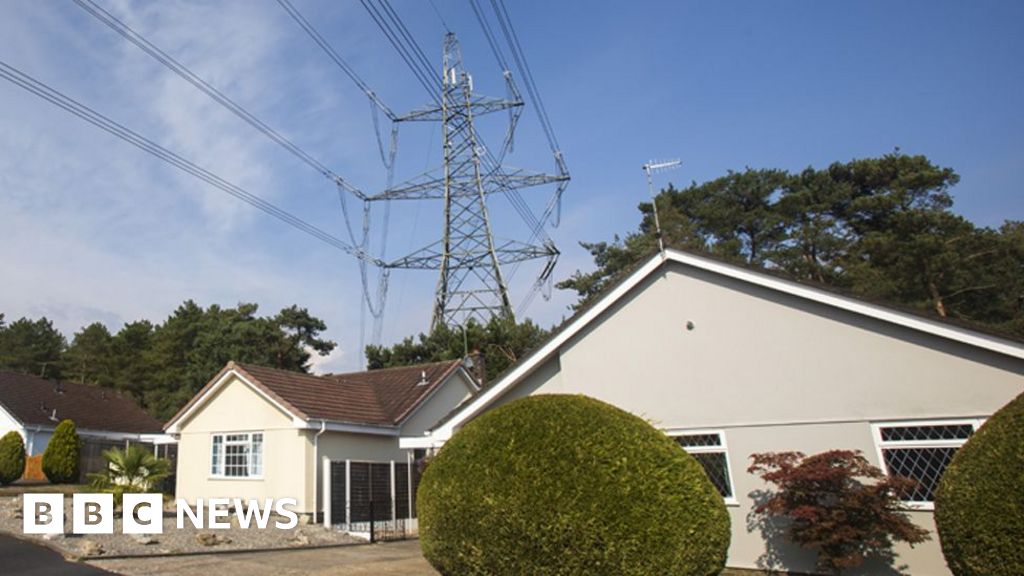Political reporters
Political correspondent
The cost of reducing energy bills for people who live near pylons will be paid for by increasing average annual bills across the country by 80p, Energy Secretary Ed Miliband has told the BBC.
Under the government’s plans, households in Great Britain within 500m of new or upgraded pylons will get discounts of up to £2,500 over 10 years, equivalent to £250 a year.
Miliband said the costs of the scheme were “more than offset” by the benefits of the new infrastructure.
He added that the idea was not about buying people off but “recognising the service” they were doing for the whole country.
However, rural campaign groups said it was “impossible to put a price on the loss of a landscape”.
A government-commissioned report found hundreds of miles of new pylons will be needed to meet its clean energy targets.
But new infrastructure proposals have sparked fierce opposition from residents in parts of the country like Norfolk and Suffolk, with campaigners arguing they will destroy the countryside.
The bill discounts, which will be funded by electricity suppliers, are expected to be in place from 2026.
Suppliers are expected to recoup costs by passing them on to other customers.
Miliband told the BBC: “At the moment, we’re having to switch off offshore wind farms because we haven’t got the transmission infrastructure.
“So everybody benefits from this. Everybody gets lower bills, and those who live near pylons are given a recognition of what they’re doing.”
The idea forms part of the government’s Planning and Infrastructure Bill, which is due to be published this week.
The legislation aims to speed up the building of new homes and infrastructure by cutting red tape and simplifying the planning process.
The government has put the changes at the heart of its push for economic growth.
Speaking to the BBC, Deputy Prime Minister Angela Rayner said local people would still be “part of the process”, but it would be “streamlined” so development was not “continually blocked for years and years”.
Alongside money off bills, the government will publish new guidance on how developers should provide benefits to communities hosting transmission infrastructure, by funding projects like sports clubs, educational programmes or leisure facilities.
The government said this would mean communities could get £200,000 worth of funding per km of overhead electricity cable in their area, and £530,000 per substation.
Initial analysis estimates both bill discounts and community funds could see a total additional cost of between £1-2 a year for the average customer over 10 years.
The government is also looking at how communities near onshore wind farms and other energy infrastructure can receive benefits.
The plans were welcomed by RenewableUK, which represents the sector.
The group’s head of policy, James Robottom, said bill discounts would “help to enable the roll-out of much-needed new grid infrastructure at a faster pace, so that we can make the most of the vast amounts of clean power we’re producing”.
However, Jackie Copley, campaign lead at CPRE, the countryside charity, said: “Investing in local green spaces or improving community infrastructure would be a better way to spend this money.
“Paying individuals comes with many problems, including questions of fairness, likely legal challenges, and the fact that it’s impossible to put a price on the loss of a landscape.”
The idea of giving people living near new pylons money off their energy bills was also proposed under the previous Conservative government.
A government survey in 2024 suggested 78% of people would find an energy infrastructure project more acceptable if they were offered discounts on their bills.
Some energy companies already offer bill discounts to customers who live near infrastructure like wind turbines, while grants are also available for local communities affected.
The bill also includes measures that would allow “ready-to-go” energy projects to jump to the front of the queue for grid connections, replacing the current “first come, first served” process.
The government says the existing system is being “clogged up” by speculative projects creating 10 year waits for “viable infrastructure”.
Meanwhile, the government has announced the number of bodies which get a say in planning decisions could be cut.
Officials will consult on removing Sport England, the Theatres Trust and the Garden History Society from the list of “statutory consultees”, who are legally required to provide advice on decisions.
The government said in some cases organisations were slowing down building, giving the example of a housing development in Bradford which was delayed because the application was thought to have not adequately considered the speed of cricket balls from a nearby club.




